Governing Knowledge: Intellectual Property Management for Development and the Public Interest
DOI:
https://doi.org/10.21874/rsp.v66i0.1278Resumo
The core point of this paper is the hypothesis that in the field of intellectual property rights and regulations, the last three decades witnessed a big change. The boundaries of private (or corporate) interests have been hyper-expanded while the public domain has significantly contracted. It tries to show that this is detrimental to innovation diffusion and productivity growth. The paper develops the argument theoretically, fleshes it out with some empirical evidence and provides a few policy recommendations on how to redesign the frontiers between public and private spaces in order to produce a more democratic and development-oriented institutional landscape. The proposed analytical perspective developed here, “Knowledge Governance”, aims to provide a framework within which, in the field of knowledge creation and diffusion, the dividing line between private interests and the public domain ought to be redrawn. The paper’s key goal is to provide reasoning for a set of rules, regulatory redesign and institutional coordination that would favor the commitment to distribute (disseminate) over the right to exclude.
Keywords: knowledge management, intellectual property, patent, public, interest, public sector, private sector, socioeconomic developmen
Downloads
Downloads
Publicado
Como Citar
Edição
Seção
Licença
- A RSP adota a licença Creative Commons (CC) do tipo Atribuição – Uso Não-Comercial (BY-NC).
- A licença permite que outros remixem, adaptem e criem obra licenciada, sendo proibido o uso com fins comerciais.
- As novas obras devem fazer referência ao autor nos créditos e não podem ser usadas com fins comerciais, porém não precisam ser licenciadas sob os mesmos termos dessa licença.
- Ao publicar o artigo na RSP, o autor cede e transfere para a ENAP os direitos autorais patrimoniais referentes ao artigo.
- O artigo publicado na RSP não poderá ser divulgado em outro meio sem a devida referência à publicação de origem.
- O autor que tiver o artigo publicado na RSP deverá assinar o Termo de Concessão de Direitos Autorais (em momento oportuno a editoria da Revista entrará em contato com o autor para assinatura do Termo).



